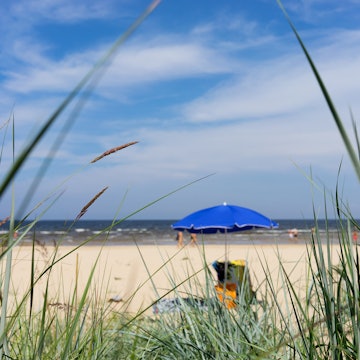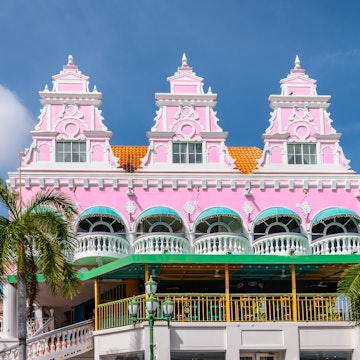
Novel adventures: how to recreate six great literary journeys

Feb 27, 2019 • 8 min read

Great literature can bring places to life, stirring our wanderlust as it fires our imagination. Whether it’s the story of a search for buried treasure, a battle against one's inner demons, or an epic, perilous journey home, brilliant books can inspire us to hit the road.
So if you're out for adventure but short on ideas, why not take a leaf out of one of these timeless tomes, recreating the fantastic journeys of their protagonists as they venture forth in search of excitement, wealth and new beginnings. Not read the source text? Pack a copy – there’s nothing like reading a classic paperback in the place where it's set.

Follow Odysseus’ voyage home
For most travellers, the journey home is a grey realm of mediocre in-flight movies and muffled sobbing. Not so for King Odysseus, hero of Homer’s ancient Greek epic The Odyssey, whose island-hopping return from the Battle of Troy lasted 10 years due thanks to colossal storms, man-eating monsters and a pesky herd of divine livestock.
Travellers wishing to visit some of the Greek isles on Odysseus' route, but who have less than a decade to spare, should consider focusing on the final stretch of his drawn-out homecoming. Start by touring the pretty villages of Corfu, where Odysseus is said to have met the hospitable Phaeacians – the ship they used to transport him home was turned to stone by a vengeful Poseidon and still sits in the bay as the islet of Pontikonisi.
Before angering any gods, hop on a ferry south to beautiful pebble-beached Paxi, a tranquil isle that some claim to be modern-day Aeaea, where the witch-goddess Circe turned half of Odysseus’ crew into pigs with cursed wine – drink responsibly! Top off the tour by sailing to Ithaki, Odysseus' homeland, where you can lay eyes on the great warrior himself – his bronzed figure greets visitors at the port.
The prologue: direct flights to Corfu are available from Athens, with ferries also running from the mainland city of Igoumenitsa. From Corfu, ferries run frequently to Paxi and on to Ithaki (via Lefkada).

Take a walk on the Wild side along the Pacific Crest Trail
Forest bathing – also known as walking in nature – has long been considered beneficial for mental health. Author Cheryl Strayed tests the strength of this theory in her memoir Wild. Struggling with drug addiction after the death of her mother, Cheryl sets off on a 1000-mile solo trek along a section of the USA’s Pacific Crest Trail, where she overcomes her demons – along with record snowfalls, roaming wildlife and the loss of most of her toenails – en route.
The Pacific Crest Trail, a magnificent hiking route that squirms along the entire length of the American west coast, is certainly no stroll in the park, but travellers looking to emulate Cheryl’s voyage of self-discovery – or simply ramble through a cross section of the USA’s most varied landscapes – should begin their journey, like her, near the town of Mojave, California.
Heading north from here, the trail twists through burnt-orange desert landscapes and on to the snow-topped High Sierra, before stretching out across the rugged wilds of Oregon to the Bridge of the Gods, the divide between Oregon and Washington – and Cheryl’s chosen finishing point. Any traveller who has got this far deserves to celebrate their achievement in a similar style – by tucking into a well-deserved ice cream.
The prologue: arguably the easiest way to reach Mojave is to take a direct bus from LA (home to an international airport) to Bakersfield and hop on the Amtrak to the town of Mojave. Would-be hikers should read up on how to tackle the trail before heading off.

Sail the high seas in search of your own ‘Treasure Island’
Responsible for sending generations of wide-eyed kids to scour beaches for buried loot, Robert Louis Stevenson's Treasure Island is one of Britain’s most beloved children’s books and popularised the depiction of pirates as rum-loving seafarers with peg-legs and parrots. The story follows the journey of young Jim Hawkins, an innkeeper's son, as he sets out from England in search of a legendary treasure hoard buried on a faraway isle.
Though Stevenson keeps the location of the island deliberately vague, those who fancy bagging themselves a share of this famous treasure (Stevenson ends the novel by saying some of the loot still remains), should hop aboard a dive boat heading for Cocos Island off the coast of Costa Rica, the reported inspiration for the setting and real-life treasure hideout – British trader Captain William Thompson is said to have buried treasure from Lima, Peru, here in the early 19th century.
Though stumbling upon gold is improbable, the island is a gem for experienced divers thanks to abundant marine life that includes sharks, rays and dolphins. Diehard treasure hunters, fear not: there are plenty of other destinations where you can uncover a real-life fortune.
The prologue: though Jim’s journey begins in the ramshackle inns of Bristol, England, it is more practical to reach Cocos Island from the Costa Rican mainland. Liveaboard dive boats depart from the port of Puntarenas, with some excursions lasting for 10 days or more.

Ride the rails with Inspector Poirot
There’s much to like about long-distance train travel: the restful sway of the carriage, the sense of adventure as you roll through unknown landscapes, the shriek of a murder victim at the centre of a tangled conspiracy. One of British writer Agatha Christie’s most famous works, Murder on the Orient Express showcased the glamour of European train travel to the public, who lapped up the story of fictional detective Inspector Hercule Poirot's hunt for a killer aboard the luxury locomotive of the title.
Alas, the original Orient Express, on which the novel’s protagonist books passage from Istanbul to Calais, ceased operating in 2009, but determined rail enthusiasts wishing to fall asleep to the soothing click-clack of rails can recreate most of the journey using a patchwork of Europe’s remaining night trains and long-distance services.
Starting in Istanbul, spend the day visiting the Pera Palace hotel – reportedly where Christie wrote much of the book – before boarding the night train to Sofia, catching a quick glimpse of the city’s onion-domed churches before securing a spot aboard the morning train to Belgrade. From here it's a direct line to Vienna, where a long-distance service runs to Paris, with a short stop off for breakfast in Zurich. Though it’s a little more taxing, the journey will cost a fraction of Poirot’s fare – and should be significantly less fraught with peril.
The prologue: the express train to Sofia departs nightly from Istanbul’s Halkali station, accessible from the city centre by bus or taxi.

Follow Richard to find your own private Thai beach
Before the word ‘overtourism’ had even been uttered, let alone typed in caps lock behind a hash sign, there was The Beach, a novel that held up a mirror to the ugliness of commercial tourism and questioned how far travellers would go in search of authenticity. Set in Thailand in the mid-90s, Alex Garland's novel focuses on British backpacker Richard, who, growing disillusioned by a lack of adventure along the ‘Banana Pancake Trail’, follows a mysterious map to a hidden island where a small group of travellers have started an idyllic, off-grid community.
Fittingly, given that it has long served as the launch pad for so many travel adventures, the action begins in the rickety hostels of the Khao San Road, Bangkok’s legendary thoroughfare. After a Chang beer and pad thai, travellers wishing to emulate Richard’s hunt for a slice of serenity should head south via night train to Surat Thani and then hop a ferry to Ko Samui, the once-heralded hippy enclave turned package holiday hotspot.
From here, boat trips run to the dreamy Ang Thong Marine National Park, where Richard’s hidden utopia is located. While the chances of stumbling on a burgeoning international community are slim, visitor numbers to the park are monitored, meaning you should be able to find a stretch of sand to call your own – a notable achievement in a country as popular as Thailand.
The prologue: Bangkok’s Suvarnabhumi Airport has flight connections with major airports around the world. From the airport, travellers can take a bus, taxi or combination of train and bus to reach the fabled street.

Retrace Frankenstein’s doomed journey around Europe
Travel is, for many, the ultimate form of escapism, and nowhere is this concept more tangible than in Mary Shelley’s classic horror story, Frankenstein. Inspired by the author’s travels around Europe, the book tells of gifted but unorthodox scientist Victor Frankenstein, whose attempts to reanimate dead tissue result in him creating a monster, which haunts him throughout his life.
While Frankenstein is not a traditional ‘travel’ text, Victor does tot up an impressive list of locales while on the run from his creation, and readers can follow his doomed journey from the grand Bavarian town of Landshut, where he constructs the monster, to the mountains of Geneva, where creator and creature reunite, and on to the misty, mysterious Orkney Islands in Scotland, where the scientist tries to make a mate for the beast.
Given that Victor's final words urge his listener to ‘avoid ambition’, following in his footsteps to the setting of the book’s epilogue, the North Pole, might prove a stretch for even the most committed fan. A more tranquil alternative is to take a trip to Frankenstein’s Castle, an ancient stone stronghold in the Odenwald mountain range that allegedly inspired Shelley’s masterpiece.
The prologue: the nearest international airport to the German town of Landshut is Munich Airport. From here it’s a 30-minute train ride to the city. For Frankenstein’s Castle, the nearest international airport is in Frankfurt, which is 40 minutes away by car.
https://shop.lonelyplanet.com/products/curiosities-and-splendour-1













